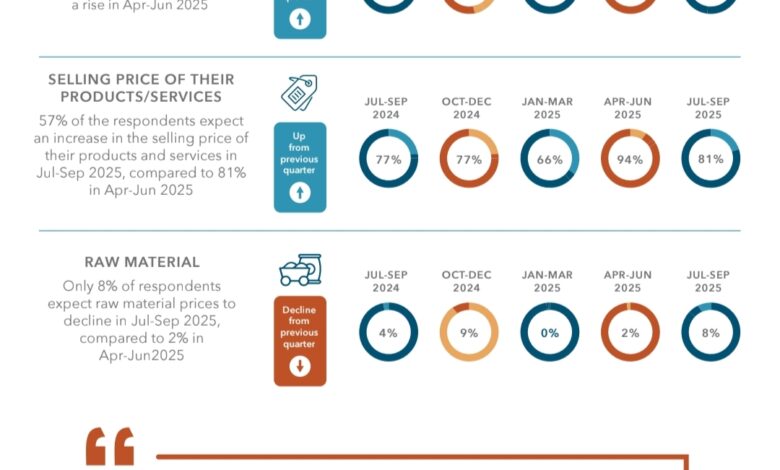Small Businesses Recalibrate Plans in Response to Evolving Demand and Profitability Trends : ASSOCHAM Dun & Bradstreet Small Business Confidence Index

New Delhi, August 26, 2025: ASSOCHAM along with Dun & Bradstreet, a leading global provider of business decisioning data and analytics, has released its Small Business Confidence Index for the Jul–Sep 2025 quarter which tracks the optimism of small and medium enterprises in India. The findings indicate a decline in small business sentiment, with the confidence index decreasing to 79.2. While the sentiment has moderated compared to the previous quarters, it signals a period of strategic adjustment, as businesses adapt to shifting global dynamics, including geopolitical uncertainties and evolving trade policies. Importantly, this adjustment phase underscores a growing emphasis on resilience, efficiency, and long-term planning. On the upside, India’s domestic economy continues to display strong fundamentals. Cooling inflation, prospects on continued monetary easing, and a promising start to monsoon season together set a favorable tone for growth and recovery in the coming quarter.
“India’s small businesses are entering a phase where agility and strategic foresight are more important than ever. Despite short-term moderation in sentiment, the Index highlights how SMEs are proactively adjusting to shifting demand patterns while leveraging export potential. Their focus on prudent cost management, workforce stability, and selective investments points to a long-term vision rooted in resilience and competitiveness qualities that will continue to drive sustainable growth.” said ASSOCHAM Secretary General Mr. Manish Singhal.
The survey indicates that small businesses are beginning to reassess their operating strategies, as sentiment across several key indicators reflects a shift toward strategic recalibration. While the domestic environment remains broadly supportive, with macroeconomic stability and policy continuity providing a foundation, recent data suggests that firms are adapting to evolving market dynamics with a forward-looking approach. Domestic orders have moderated, but businesses are maintaining a proactive stance, with 62% of respondents reporting an increase in the volume of sales, reflecting continued activity in core markets.56% of businesses reported growth in new export orders received, indicating that firms are leveraging global opportunities to diversify revenue streams. This outward orientation suggests resilience and adaptability in the face of domestic demand fluctuations.
“The ASSOCHAM D&B Small Business Confidence Index for Q3 2025 reveals a strategic recalibration among small businesses, as firms adapt to evolving market dynamics with a forward-looking approach. Despite a moderation in domestic orders, the sustained momentum in core markets and a rise in new export orders reflect a proactive stance toward global diversification. Stability in selling prices and easing input cost pressures support margin predictability. Meanwhile, prudent inventory management and a stable employment outlook underscore operational resilience. As businesses realign investment priorities and navigate external trade frictions, the emphasis on cost optimization and strategic agility will be critical to sustaining performance in a shifting economic landscape. This cautious financial sentiment is echoed globally, with Dun & Bradstreet’s Global Business Optimism Index recording a -9.7% dip in financial confidence among small businesses, reaffirming the widespread focus on resilience
and stability amid economic headwinds,” said Mr. Avinash Gupta, Managing Director, Dun & Bradstreet India.
57% of businesses indicate selling prices to increase, suggesting that firms are managing to sustain pricing levels despite competitive pressures. Meanwhile a higher percentage of respondents expect lower raw material prices in Jul-Sep quarter 2025.This trend could support margin stability and enhance cost predictability in the coming quarters. Inventory levels are being managed prudently, with 60% of businesses reporting a balanced inventory of raw materials and work in progress, aligned with demand expectations. On the employment front, 68% of firms indicated a stable or growing total number of employees, underscoring the sector’s commitment to maintaining operational capacity and talent retention. While profitability sentiment has seen some recalibration, businesses are focusing on cost optimization and operational efficiency to navigate the current landscape. The strong sentiment around raw material prices suggests easing input cost pressures, which could provide relief for procurement and cost planning. Investment sentiment is being realigned with a focus on strategic priorities, as businesses adopt a more selective approach to capital deployment. External factors such as tariff-related tensions and global trade frictions continue to pose challenges, but firms are responding with greater agility and scenario planning.
“Small businesses are entering a phase of strategic transformation, balancing domestic stability with global opportunity, as reflected in the ASSOCHAM D&B SBCI Index for Q3 2025. The moderation in domestic orders is being offset by a notable rise in export activity, signaling a shift toward outward-oriented growth. Encouraging trends in input cost normalization and pricing stability are enhancing cost predictability, while steady employment and inventory levels reflect cautious optimism. As firms recalibrate investment strategies amid persistent global trade uncertainties, Dun & Bradstreet data suggests that the sector’s resilience will hinge on its ability to manage cost structures, preserve flexibility, and prioritize investments that build long-term competitiveness,” said Dr. Arun Singh, Global Chief Economist, Dun & Bradstreet.
Looking ahead, the ability of small businesses to navigate this evolving landscape will depend on how effectively they manage cost structures, preserve operational flexibility, and prioritize investments that enhance resilience. As domestic momentum moderates and external risks persist, strategic agility will be key to sustaining business confidence and performance.







